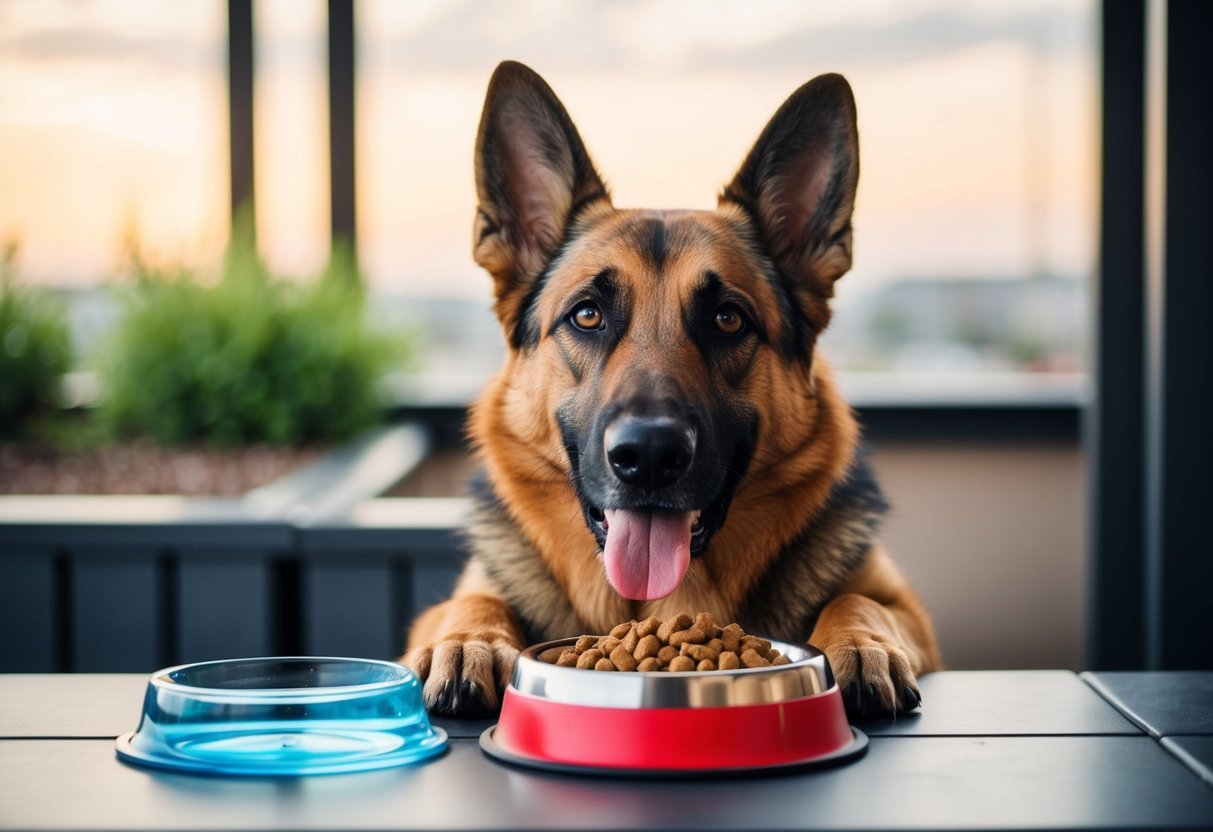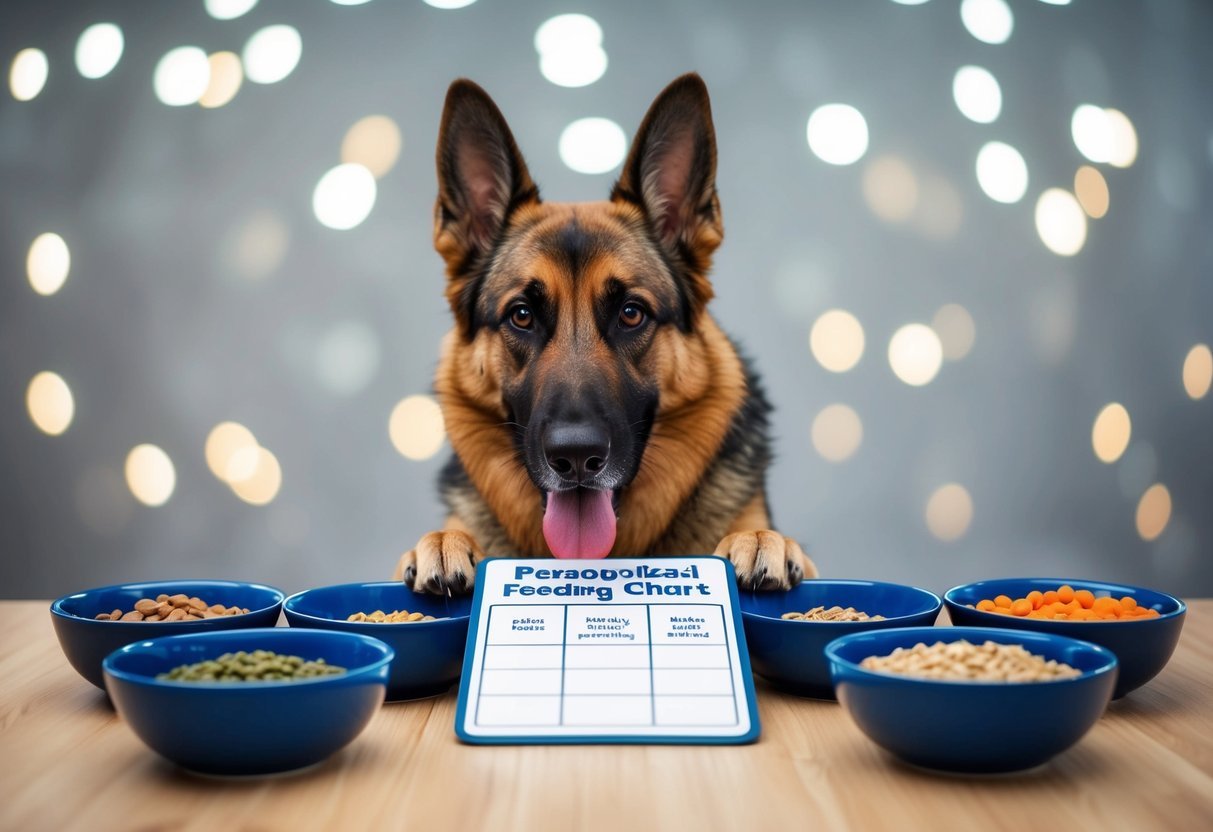Feeding your German Shepherd the right way is key to their health and happiness.
With the right feeding charts, you can help your pet thrive and get the nutrition they need at every stage of their life.
Knowing how much and what type of food to give is essential for their growth, energy, and well-being.
As a German Shepherd owner, understanding these feeding guidelines can make a big difference in your dog’s life.
Proper nutrition supports their muscle development, bone strength, and overall health.
In this article, you will find four helpful feeding charts that will guide you in choosing the best meals for your furry friend.
The Benefits of Scheduled Feeding for German Shepherds – Expert Insight

Scheduled feeding can really benefit your German Shepherd.
It helps create a routine.
Dogs thrive on consistency, and having set meal times can reduce anxiety.
When you feed your dog at the same times each day, it can help with digestion.
A regular schedule makes it easier for your pet’s body to know when to expect food.
This can lead to better nutrient absorption.
Another plus is weight management.
Scheduled feeding allows you to control portions better.
You can prevent overeating, which is important for maintaining a healthy weight.
Scheduled feeding can also reduce begging and food-related behavior issues.
Your dog learns when to expect meals.
This can lead to a more relaxed attitude around food.
Finally, it simplifies training.
Knowing when they will be fed can help you teach your pet better manners.
With less food distraction, training sessions can be more focused.
2) Understanding Portion Control for Optimal Health – Vet Approved
Keeping your German Shepherd at a healthy weight is important.
Portion control plays a big role in making that happen.
Ask your vet how much food your dog needs based on age and activity level.
This helps to avoid overfeeding.
Use measuring cups to serve the right amount of food.
It’s easy to guess, but measuring ensures accuracy.
You might want to feed your dog twice a day.
This helps with digestion and keeps energy steady.
If your dog has health issues, special feeding plans may be necessary.
Watch your dog’s weight and adjust portions as needed.
Regular check-ups can help track progress.
Treats can be part of the diet, but keep them small and limited.
Too many treats can lead to weight gain.
Providing a balanced diet with the right portions helps your dog live a longer, healthier life.
3) Meal Timing: How to Keep Your Shepherd’s Energy Levels Steady – Dog Trainer Tip

Meal timing is important for your German Shepherd.
Feeding at the same times each day helps keep their energy steady.
When you stick to a schedule, your dog knows when to expect food.
Try to feed your dog two to three times a day.
This keeps their metabolism active and helps prevent boredom.
If they eat too much at once, they might feel sluggish.
Pay attention to how your dog acts.
If they seem energetic after meals, you probably have a good schedule.
If they seem tired, consider adjusting the timing or the amount you feed them.
Be mindful of exercise and playtime too.
Timing meals around play can also help keep energy levels steady.
Just wait an hour after eating before any intense play.
Stick to your plan as your dog grows.
Puppies and adult dogs have different needs.
Adjust meal times and portions as needed to keep your Shepherd happy and healthy.
Incorporating Nutrient-Rich Foods for a Balanced Diet – Nutritionist Advice
To help your German Shepherd thrive, focus on adding nutrient-rich foods to their diet.
This means including a variety of proteins, healthy fats, and carbohydrates.
Proteins like lean meats, fish, and eggs are essential.
They help build muscles and keep your dog strong.
Make sure to choose high-quality sources and avoid processed options.
Healthy fats are also important.
Ingredients like fish oil and flaxseed oil can support skin health and shiny coats.
These fats provide energy and help with brain function too.
Don’t forget about carbohydrates.
Foods like sweet potatoes, brown rice, and oats offer energy.
They also supply fiber, which keeps your dog’s digestive system running smoothly.
Fruits and vegetables can be great additions as well.
Carrots, blueberries, and spinach provide vitamins and antioxidants.
These help boost your dog’s immune system and overall health.
Always consult with your vet or a pet nutritionist before making big changes to your dog’s diet.
They can give you tips and help you find the right balance for your German Shepherd.
This ensures your furry friend gets the best nutrition possible.
Understanding Your German Shepherd’s Nutritional Needs

Feeding your German Shepherd the right nutrition is key for their health and happiness.
Knowing what to include in their diet and what to watch out for can help you avoid common issues.
Importance of a Balanced Diet
A balanced diet is crucial for your German Shepherd.
It helps maintain a healthy weight, strong muscles, and shiny fur.
Your dog needs a mix of proteins, fats, carbohydrates, vitamins, and minerals.
High-quality protein sources, like chicken or fish, support muscle health.
Healthy fats, such as those from fish oil, promote a shiny coat and good skin.
Carbohydrates should come from whole grains or vegetables for energy.
Consider this simple table for a balanced diet:
| Nutrient | Importance | Sources |
|---|---|---|
| Protein | Builds and repairs tissues | Chicken, beef, fish |
| Fats | Energy source and skin health | Fish oil, chicken fat |
| Carbohydrates | Provides energy | Brown rice, sweet potatoes |
| Vitamins | Supports immune function | Leafy greens, carrots |
| Minerals | Strong bones and teeth | Calcium, phosphorus-rich foods |
Common Nutritional Deficiencies
Being aware of common nutritional deficiencies can help you keep your German Shepherd thriving.
One issue is a lack of calcium, which can lead to weak bones and dental problems.
Another common deficiency is protein.
Insufficient protein can cause muscle loss and poor coat condition.
Omega-3 fatty acids are often low in homemade diets, which can affect heart and skin health.
To avoid these issues, look for commercial dog foods that are complete and balanced.
You can also consult your vet for advice tailored to your dog’s specific needs.
Regular check-ups can help catch any early signs of deficiencies.
Creating a Personalized Feeding Plan

When planning meals for your German Shepherd, it’s essential to consider various factors that can affect their nutritional needs.
Tailoring the feeding plan to their age, activity level, and specific health conditions will help ensure they stay healthy and happy.
Factors to Consider
Start with your dog’s weight.
Knowing their ideal weight will guide portion sizes.
You can use a dog food calculator to find the right amounts based on the food brand you’re using.
Next, consider their activity level.
If your German Shepherd is active and exercises regularly, they may need more calories than a more sedentary dog.
Don’t forget about any special dietary needs.
For example, some dogs have allergies or sensitivities to certain ingredients.
Always consult with your veterinarian for advice tailored to your dog.
Adjustments for Age and Activity Level
Puppies need more frequent meals compared to adults.
Generally, feed them three to four times a day until they’re about six months old.
Older dogs, after about a year, can transition to two meals a day.
As they age, their metabolism may slow down.
For mature dogs, adjust portions to prevent weight gain.
Active dogs, especially those in training, may require more calories.
It’s key to monitor your dog’s weight regularly.
If you notice they are gaining or losing weight unexpectedly, adjust their food intake accordingly.
Keeping track of these factors helps ensure your German Shepherd thrives at every stage of their life.
Frequently Asked Questions

You probably have some questions about feeding your German Shepherd.
Here’s what you need to know about feeding schedules, ideal diets for puppies, and more.
How often should I feed my German Shepherd each day?
Typically, you should feed your German Shepherd two to three times a day.
Puppies need more frequent meals, while adults can stretch to twice daily.
Regular feeding helps maintain steady energy levels.
What kind of diet is ideal for a German Shepherd puppy?
A German Shepherd puppy needs a diet that is high in protein and calories.
Look for puppy food specifically made for large breeds.
This will support their rapid growth and overall health.
How much food does a German Shepherd need daily?
An adult German Shepherd generally needs about 1.5 to 2.5 cups of high-quality dog food each day.
The exact amount depends on their age, size, and activity level.
Always adjust based on your dog’s specific needs.
What’s a good feeding routine for a German Shepherd to help gain weight?
To help your German Shepherd gain weight, feed them more frequently, about three to four times a day.
Choose calorie-dense foods and consider adding nutritious toppings like wet food or healthy treats to their meals.
Can you suggest a homemade diet plan for a German Shepherd pup?
For a homemade diet, you can mix lean meats, vegetables, and grains.
Cooked chicken, rice, and carrots are good options.
Make sure to consult your vet for portion sizes and to ensure balanced nutrition.
What are the age-specific nutritional needs for German Shepherds?
Puppies need higher protein and fat levels for growth.
Meanwhile, adults require a balanced diet to maintain their weight.
Older German Shepherds may benefit from diets lower in calories but higher in fiber to aid digestion.
Adjust their food as they age for the best health.

